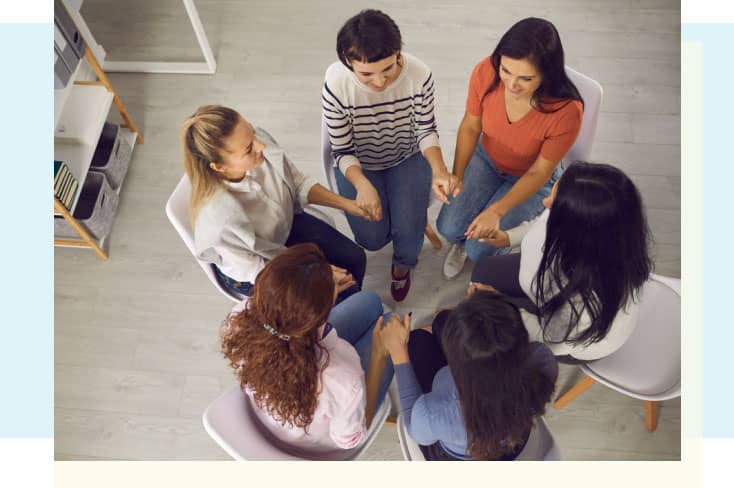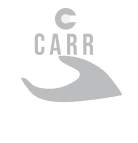you don't have to do recovery alone
Bringing a significant amount of structure into our lives is of the essence when it comes to long-term success in recovery. Our program was carefully designed to help women reshape their lifestyle into one where they can remain emotionally healthy, responsible, productive, and happy for good. There is no maximum time someone can spend in our program, and the program evolves with our clients the longer they stay, giving them extra privileges and freedoms the longer they stay in recovery. Our three-phase approach helps clients gradually become more independent and self-reliant as their time progresses. Some of our clients have been with us for a long time, sometimes years, and they have the experience and stability to help those coming into the program with less clean and sober time than they do. That is the beauty of our therapeutic community! Most of us learn most easily by watching what others do that works.
House recovery meetings help our clients understand where all of their housemates are at in their journey. Support and accountability are cornerstones of our program and we expect that all clients, staff, volunteers, and guest treat one another with the utmost respect they deserve. Read on to find out more about our program.
recovery
support & accountability
Peer support through the recovery process is essential. There is no better place to cultivate that mutual support than in your own home. Each woman is a very important part of our family, and we treat each other as such, with respect, kindness, understanding, and compassion.
In OUR houses, you are a family member and a team member. Everyone works together to keep the houses in order and contribute to a positive, constructive, and loving environment. This step in your recovery is a smooth transition between sheltered and protected living and your new, fully independent life. Here, you have unlimited tools and support to use while you find your own way.

The vast majority of sober living environments have rules, and all of ours can be summed up as: respect yourself, respect others, and respect your environment. Active participation in a structured program of recovery and meeting attendance are required. We know that recovery programs are not “one size fits all” and fully support you in finding one that resonates with you. Every house member is expected to submit to periodic, random alcohol and drug screening to ensure the safety of everyone. For a complete list of the house rules, please CONTACT US.
It is a fact that a good portion of alcoholics and addicts in recovery also struggle with co-occurring disorders, mental health conditions, and a history of trauma. We understand how these components come intertwined for many women. We have been there, and done that, and can help you acquire outside resources, tools, and skills to continue to heal and manage all areas of your life.
We hold periodic, in-house support groups and there is always a head resident, staff member, or volunteer available to help with whatever you need.
get help - living sober
with our women's
recovery program
“Where do I go to buy groceries? How do I find a doctor? Where are the meetings? I want to go to IOP, but where are the good ones? How do I get around?”
You don’t have to do this alone.
We don’t expect you to have your new living situation completely figured out by day two. Our staff, house managers, and other residents will help you get settled and help you figure out the finer details of things you want to put into place to foster your sustained recovery. “Rome wasn’t built in a day.” It was built over time, by a team. The family environment at Zen Mountain Sober Living is very supportive. Everyone helps everyone else and there is nothing we can’t accomplish together.
meetings
House recovery meetings help our clients understand where all of their housemates are at in their journey. Support and accountability are cornerstones of our program and we expect that all clients, staff, volunteers, and guest treat one another with the utmost respect they deserve. Peer support through the recovery process is essential. There is no better place to cultivate that mutual support than in your own home. Each woman is a very important part of our family, and we treat each other as such, with respect, kindness, understanding, and compassion.
In OUR houses, you are a family member and a team member. Everyone works together to keep the houses in order and contribute to a positive, constructive, and loving environment. This step in your recovery is a smooth transition between sheltered and protected living and your new, fully independent life. Here, you have unlimited tools and support to use while you find your own way.
The vast majority of sober living environments have rules, and all of ours can be summed up as: respect yourself, respect others, and respect your environment. Active participation in a structured program of recovery and meeting attendance are required. We know that recovery programs are not “one size fits all” and fully support you in finding one that resonates with you. Every house member is expected to submit to periodic, random alcohol and drug screening to ensure the safety of everyone.

It is a fact that a good portion of alcoholics and addicts in recovery also struggle with co-occurring disorders, mental health conditions, and a history of trauma. We understand how these components come intertwined for many women. We have been there, and done that, and can help you acquire outside resources, tools, and skills to continue to heal and manage all areas of your life.
We hold periodic, in-house support groups and there is always a head resident, staff member, or volunteer available to help with whatever you need.
Sober Living
Program Overview

Zero Tolerance Rules
Infractions of the following rules may result in immediate dismissal from the program.
- Alcohol and/or drug use or possession is strictly prohibited.
- No sexual contact between staff, management, clients, and/or guests.
- Violence, discrimination, or hateful behavior, whether on or off the premises of the facility, will not be tolerated.
- Stealing of any kind whether on or off the premises of the facility is given zero tolerance.
Program Requirements for All Clients
Chores:
Clients are expected to make their beds daily upon awakening. Daily chores will include tasks that keep the house clean, neat, organized, and running smoothly throughout the week. House deep cleaning in done weekly during a two-day window designated by individual houses.
Productivity:
All clients are expected to remain working, volunteering, attending school, participating in IOP, or any combination of those four things for at least 30 hours each week.
Meeting Attendance:
In-house: Twice weekly house meetings (in individual houses) and twice monthly program-wide meetings.
Outside meetings: Attend a minimum number of recovery-based meetings/activities per week on a step-down schedule based on length of sobriety (i.e. four/week for phase I, three/week for phase II, etc.) Zen Mountain is an all-pathway friendly program and encourages a wide variety of meeting types and other recovery support.
Mentorship:
Maintain weekly mentorship meetings with a 12-step sponsor and/or recovery coach.

Three Phase recovery Structure
Phase I
Lasts at least four weeks following admission. Only a manager can graduate clients from Phase I to Phase II. To move onto the next phase of the Program, clients are required to:
- Attend a minimum of four recovery meetings/activities per week for at least four weeks.
- Complete four weekly sessions with a Certified Peer Recovery Coach.
- Begin actively working a structured program of recovery suggested and supervised by their mentor(s).
- Establish a regular weekly productivity schedule. All clients must be working, volunteering, attending school, participating in IOP, or any combination of those four things for at least 30 hours each week.
- Abide by 9pm curfew. House managers may give extensions.
- No overnights.
- Inform the house manager of all commitments, errands, and activities prior to leaving the house.
- Adhere consistently to program standards, requirements, and expectations.

Phase II
After satisfying all requirements above, Clients are given additional privileges.
- Curfew is revised to 11:30 p.m. (unless you are working past then)
- Clients may take up to two overnights per week.
- Maintain weekly meetings with at least one recovery mentor. If you wish to discontinue working with your recovery coach, you must find a sufficient substitute first (sponsor, life coach, or spiritual leader).
- Clients may come and go as they please from the house. They will still be expected to sign in and out but will no longer have to share all activities/commitments/errands in advance with the house manager.
Phase III
Long-term clients only.
- After a client achieves at least 5 months of continuous abstinence, additional privileges may be given.
Rates, Pricing, &
What’s Included
Most of the expenses of household living are included in your monthly fee except for food, clothing, and personal hygiene items. Here are some of the items that will be provided free of charge:
- Wi-Fi
- Desktop computer access/use
- Bath towel set
- Laundry detergent
- Cleaning supplies
- Drug and Alcohol
- Monitoring
- Water
- Electricity and gas
- Trash service
- Toilet paper & paper towels
- Hand soap & dish soap
- Dish-washing detergent
- Bed linens, blankets, and pillows
Drug & Alcohol Monitoring
Urinalysis (UA) and breathalyzer tests are done periodically on a random basis.
Rates:
Our monthly rent varies per location. All new clients are charged a $150 admission fee upon move in along with first month’s program fees.
- Aurora Houses (Allison House, Miller House): $995/month
- Centennial Houses (Phillips House, Jamison House): $1,095/month
- Denver House (Charles House): $1,095/month
- Single Rooms: $1,395 (Centennial and Denver), $1,295 (Aurora)
- Non-Refundable Admission Fee: $150
- Rates include essential household supplies, sobriety monitoring, bed linens/pillows/towels, and much more.
- Clients are only responsible for their own food, clothing, hygiene products, and personal/comfort items.

Frequently Asked
Questions
What Is Your Capacity?
We have six homes and our capacity ranges from 9 -11 women per house. Our homes are spacious and not crowded. We accommodate our residents by providing things like multiple bathrooms, large bedrooms, and opposite schedule options. To help create a comfortable transitional sober environment.
what are the daily activities?
Our program is designed to prepare women to live a happy, healthy, well-balanced and productive life. So, put simply, daily activities look a lot like what any successful woman early in recovery would look like. Most women’s daily activities include doing chores and getting ready for the day, go to work and a meeting, hang out with friends, and take care of their personal business. It’s pretty much like independent living where they are tackling the challenges of normal life again.
what are the house rules?
The required general rules for each house are regular meetings and the residents must work with a sponsor, recovery coach, spiritual leader or anyone else that can hold a mentorship role for them. Additionally, residents are required to work, volunteer, or attend school while they are with us. For more detailed rules and regulations please contact us.
what are the support services?
Our support services include in-house, peer led recovery meetings and help with resources for doctors, mental health professionals, and therapists. We also give referrals for recovery coaches and women in the community that are active in 12-step sponsorship. We can assist residents in finding social assistance benefits, file past due taxes, legal problems, etc.
Living with substance use or dependency can cause a lot of wreckage and issues that we have to go back to and deal with later in recovery. We will help residents with anything they need help with, and if we don’t know how, we know someone that does.

How Long Does/can Someone Stay?
Minimum stay is 1 month. Residents can stay as long as they want as long as they are following the program and standards. We will never ask someone to move on if they don’t feel ready, or simply don’t want to leave.


